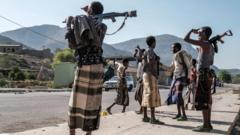The Tigray People's Liberation Front (TPLF) has raised alarms concerning the potential resurgence of violence in Northern Ethiopia owing to a ban on its activities, which they argue undermines the 2022 peace agreement that concluded two years of conflict.
Ethiopia's Tigray Party Opposes Ban Amid Peace Deal Concerns

Ethiopia's Tigray Party Opposes Ban Amid Peace Deal Concerns
Ethiopia's Tigray People's Liberation Front warns a recent ban jeopardizes the fragile peace established in 2022.
The Tigray People's Liberation Front (TPLF), the primary opposition party in Ethiopia, has voiced strong objections to a newly imposed ban on its operations, which it believes poses a significant threat to the peace deal forged in 2022 that aimed to halt the ongoing conflict in the Tigray region. Following a decision by the National Election Board of Ethiopia to revoke the TPLF's legal status, the party has implored the African Union to mediate between it and the federal government.
The electoral agency's ban stems from the party's failure to hold a general assembly, a requirement it has been unable to fulfill due to internal strife, with two factions vying for leadership within the party. The TPLF, which governed Tigray and was pivotal in Ethiopia's national politics for decades, was dissolved after Prime Minister Abiy Ahmed ascended to power in 2019 and replaced it with a new national political entity.
As Ethiopia anticipates nationwide elections by mid-2024, tensions have escalated within the Tigray region. The TPLF, which has overseen Tigray's interim administration established as part of the Pretoria peace agreement, has formally protested the electoral board's decision, highlighting that it contradicts the peace deal's stipulations that both parties respect each other's legitimacy and resolve political issues through dialogue.
Ammanuel Assefa, the TPLF's deputy chairman, warned the government’s actions could endanger the fragile peace process, emphasizing that the repercussions of such a decision extend beyond the party itself and threaten the sacrifices made during the conflict. As the situation remains precarious, various international stakeholders, including the US, UK, and the European Union, have issued warnings about the potential for renewed violence if tensions are not addressed. Delays surrounding the implementation of the peace agreement have exacerbated concerns, particularly regarding the return of approximately one million displaced individuals from the war.
As Ethiopia stands at a crossroads, the urgent need for dialogue and reconciliation has never been more pronounced, with the international community watching closely in anticipation of developments in the Tigray conflict.
The electoral agency's ban stems from the party's failure to hold a general assembly, a requirement it has been unable to fulfill due to internal strife, with two factions vying for leadership within the party. The TPLF, which governed Tigray and was pivotal in Ethiopia's national politics for decades, was dissolved after Prime Minister Abiy Ahmed ascended to power in 2019 and replaced it with a new national political entity.
As Ethiopia anticipates nationwide elections by mid-2024, tensions have escalated within the Tigray region. The TPLF, which has overseen Tigray's interim administration established as part of the Pretoria peace agreement, has formally protested the electoral board's decision, highlighting that it contradicts the peace deal's stipulations that both parties respect each other's legitimacy and resolve political issues through dialogue.
Ammanuel Assefa, the TPLF's deputy chairman, warned the government’s actions could endanger the fragile peace process, emphasizing that the repercussions of such a decision extend beyond the party itself and threaten the sacrifices made during the conflict. As the situation remains precarious, various international stakeholders, including the US, UK, and the European Union, have issued warnings about the potential for renewed violence if tensions are not addressed. Delays surrounding the implementation of the peace agreement have exacerbated concerns, particularly regarding the return of approximately one million displaced individuals from the war.
As Ethiopia stands at a crossroads, the urgent need for dialogue and reconciliation has never been more pronounced, with the international community watching closely in anticipation of developments in the Tigray conflict.




















